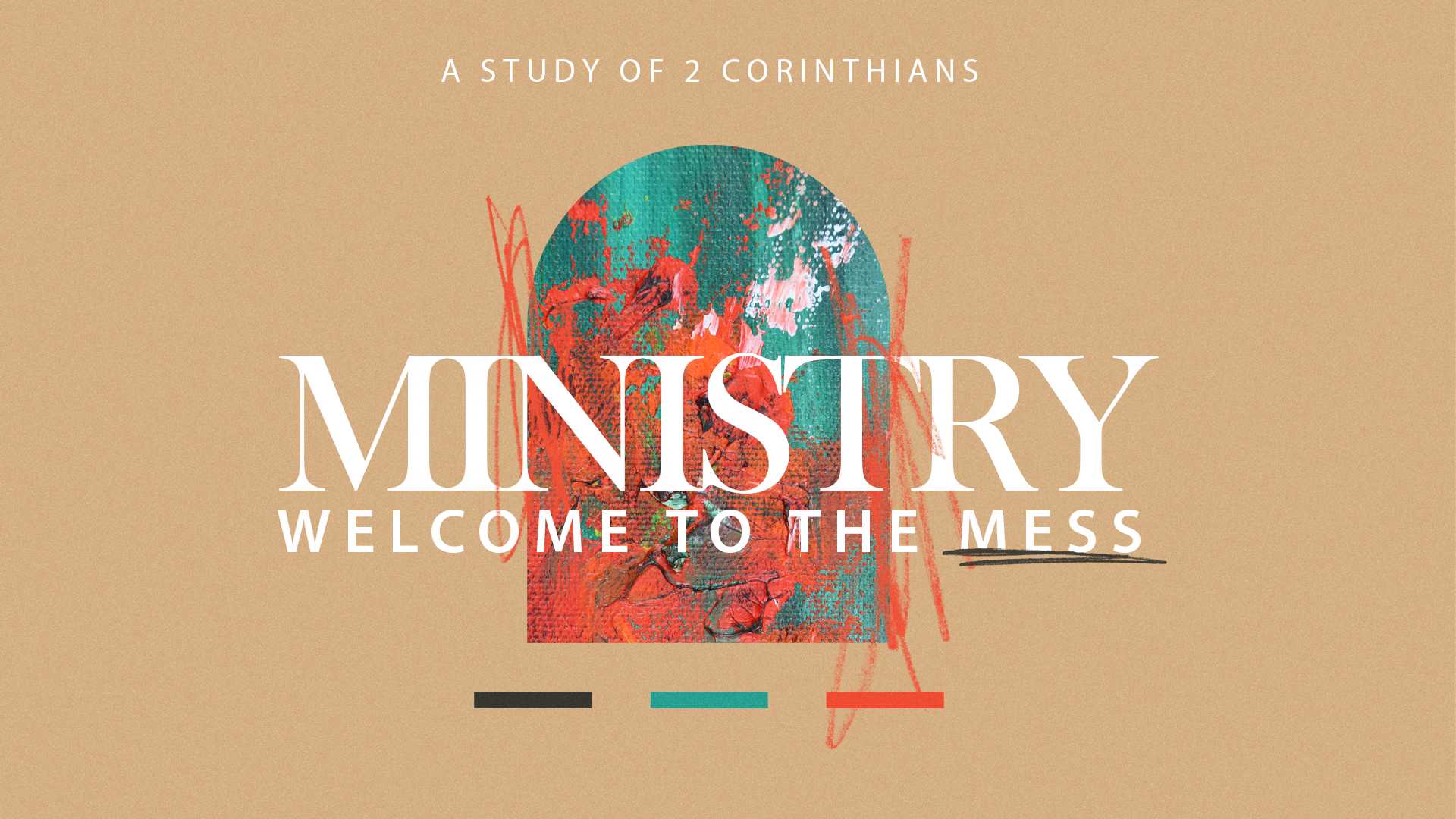In This Series
Reality Check: The Importance of Examination
2 Corinthians 12:11-13:10 (ESV)
May 28, 2023
Josh Beakley
We pray in his name and we’re going to listen to his word together here from Second Corinthians, second Corinthians, and we’re just about finished with our series through ministry. Welcome to the mess. Looking at a church in Corinth, God’s preserved his word for our own edification that we would grow and know what it means to follow Jesus as a church. Family doing ministry even when it gets messy and learning that in fact ministry is messy and we’re in Second Corinthians chapter 12 and we’re going to go move our way into Chapter 13 this morning, and we’re kind of bridging between last message and this message. And So what I’ll do is I’ll read second Corinthians chapter 12, verse 11 through Chapter 13, verse 10, and we’ll have you remain seated. It’s outside in a longer passage. But we trust that we’re in honor of God’s word, receiving it together. So, second Corinthians, chapter 12. Starting in verse 11.
I have been a fool. You forced me to it for I ought to have been commended by you. For I was not at. All inferior to these. Super apostles, even though I’m nothing. The signs of a true apostle were performed among you with utmost patience, with signs and wonders and mighty works. For in what were you less favored than the rest of the churches? Except that I myself did not burden you. Forgive me this wrong here for the third time I am ready to come to you and I will not be a burden for I seek not what’s yours, but you. For children are not. Obligated to save up for their parents, but parents for their children. I will most gladly spend and be spent for your souls. If I love you more, am I to be loved less? But granting that I myself did not burden you, I was crafty. You say and got the better of you by deceit. Did I take advantage of you through any of those whom I sent to you? I urged Titus to go and sent the brother with him. Did Titus take advantage of you? Did we not act in the same spirit? Did we not take the same steps? Have you been thinking all along that we’ve been defending ourselves? It’s in the sight of. God, that we’ve been speaking in Christ and all for your upbuilding beloved.
For I fear that perhaps when I come, I may find you not as I wish, and that you may find me. Not as you. Wish that perhaps there may be quarrelling, jealousy, anger, hostility, slander, gossip, conceit and disorder. I fear that when I come again, my God may humble me before you and I may have to mourn over many of those who send earlier and have not repented of their impurity, sexual immorality and sensuality that they’ve practiced. This is the third time I’m coming to you. Every charge must be established by the evidence of two or three witnesses, and I warn those who send before and all the others. And I warn them. Now, while absent, as I did present on my second visit, that if I come again, I will not spare. Since you seek proof that. Christ is speaking in me. He’s not weak in dealing with you, but he’s powerful among you. For he was crucified in weakness. But lives by the power of God. For we also. Are weak in him, but in dealing with you, we. Will live with him by the power of God. Examine yourselves to see whether you are in the face. Test yourselves or do you not realize this about yourselves, that Jesus Christ is in you? Unless indeed you fail to meet the test? I hope you will find out that we have not failed the test, but we pray to God that you may not do wrong, not that we may appear to have met the test, but that you may do what? Is right, though we may have seemed to fail. For we cannot do anything against the truth, but only for the truth, for we are glad when we are weak and you are strong. Your restoration is what we pray for. For this reason, I write these things while I’m away from you, that when I come, I may not have to be severe in my use of the authority that the Lord has given me for building up, not for tearing down.
Well, let’s pray together and ask for God’s guidance this morning.
Father, we thank you for the truth of your word. The heart of Christ that’s seen through the apostle Paul. Your spirit speaking still to us. And we asked that you’d help us to learn what real relationship looks like in following Jesus together in a church family, as messy as it might be. Would we ask that you would give us courage and conviction and clarity about what that means for us not only to day, but this week and beyond. In Jesus name we pray.
In the year. 2000 American Television was transformed by a show that catapulted this undeveloped genre of reality TV into the public square in a new way. The spectacle it featured a group of strangers that were stranded on an island where they competed against each other for $1,000,000 grand prize. Each week a contestant was voted off the island in a dramatic fashion as the players ruthlessly deceived, tricked and sabotaged their own alliances and efforts to outwit, outplay and outlast their fellow teammates, and then earn the bragging rights of the title of Soul Survive. After the show became one of the more unsettling pictures of how human nature unfolds when driven by personal desire at the expense of others, not only to the watching public but also to the contestants themselves. As the show develops, they sometimes would give contestants opportunity after 40 days or so stranded on this island. Without modern amenities to look in the mirror or step on a scale for the first time in weeks, and those moments would bring a shock to the players they discover. Wow, I’ve lost this much weight. Wow, this is what I actually look like.
But it was nothing compared to the experience that would occur once they were back in country, and the show would air nationally and they would see themselves and hear everyone’s perspective on their approach to relationships and where all of their lies and schemes were fully exposed. It’s an experience that proves time and time again to deliver to all the contestants A tremendous reality check. The Corinthians are wrapped up in a kind of celebrity showdown after Paul’s initial planting of this church, and there’s some hard ups and downs and church life and a rescheduled visit and certain charismatic teachers now crept into their midst and began to erode the Corinthians trust in their shepherd. And a competition, a struggle is underway.
Whereby these teachers have begun spreading a smear campaign to tear down Paul’s reputation, spreading rumors about his integrity and intentions. They’re working hard to build themselves up at the expense of the apostle, and ultimately the entire flock. Yet the Corinthians, because of their own weaknesses and perhaps pet sins and love of celebrity, they’re deeply enthralled. They’re incited by these allegations against Paul and drawn to the blood in the water. So Paul is forced to respond.
Even though this is a game that he refuses to play. I mean, at least. He’s not playing according to Human will and for a human win. He’s not in a battle for his own honor and benefit to that he would happily give away and lose. But he was. He’s wrestling with the war over this church, not for his own sake, but for theirs. And he’s accepting the need to confront the issue of his credibility because it is. Too closely tied with the gospel. He’s forced to communicate his credentials and then face this issue head on in a way that makes most feel desperately uncomfortable. But he does so because he’s unwilling to settle for the veneer of fake relationship that these false teachers have tacked on. He loves the Corinthians enough to bear his true self before them, and then to challenge them to look into the mere and consider things not as someone paints them to be, or even what we hope for them to be, but how they truly are. He wants them to face reality. The reality of their relationship with him, with one another and most importantly, the reality of their relationship with God. We too, live in a world of celebrity, of photo filters, of AI images of thousands of social media friends and likes of being connected and familiar with more people than ever and yet intimate and fully known by fewer than ever. A world of.
Deep fakes and it’s only growing. But the truth is that fake is not new. Counterfeit happiness. Fake love. Relationship. They’ve been the battle since Satan’s lies enticed the first of mankind. Scriptures are full of warnings about fakeness, about lies, about deceptions and counterfeit and pretend and hypocrisy. Most significantly in the realm of relationships. And no area presents more danger to our eternal well-being than settling for fake when it comes to relationships and no relationships more dangerous to fake than the relationship that we have with God.
Are your relationships. How healthy are your relationships?
Relationships with parents. With siblings. Perhaps your roommate? Coworkers or fellow students would be a boss or teacher or a coach. Employees or neighbors? Maybe children or your spouse. Or your church leaders or fellow church members. And then there’s this.
How’s your relationship with God? How healthy are your relationships?
To complex question. And how do you begin to answer? How would you evaluate your relationships? What standards would you use? What criteria? How would? You look and try to assess the health of what’s going on. There’s a lot of ways to approach it, but this morning let’s just approach it through the lens of authenticity. We’ll ask it like this is your relationship with Jesus and your relationship with his people. Is it real? Is it real? Do you truly, really actually know God? And are you truly known by him? Is your relationship with God and with his people real? We’re not asking if it’s easy. We’re not asking if it’s pretty. We’re not asking if it’s comfortable.
We’re asking, is it real? And today’s truth is one of the most simple ideas that we acknowledge yet struggle to practice is, is this real relationships live in reality. Real relationships live in reality. And reality is sometimes a very hard place to be. A place where we’re sharing what we’re really thinking and feeling. It’s hard to step onto the scale and actually look at the numbers. It’s hard to actually open up the charts and look at the blood work or to let the dentist scan the charts and open the results and assess what’s actually going on.
It’s hard to ask someone what’s really happening and what they’re really going through, and for us to open up and share, because such vulnerability, such exposure takes risk and trust. Reminds us of our deep need for help and ultimately for grace. So it becomes easy to. Settle for fake for superficial for surface level with people, but more dangerously with God. But were called into something more, something deeper, something truer. Relationships that are real with people.
And with him. And the place that he’s designed for that reality to be most evident, most exposed for the most amount of vulnerability and truth to occur, to be real. The best place in the entire world to dive into real relationships is in fact. The church. The church. Now it doesn’t mean that that’s where relationships are going. To be the. Easiest or even where relationships might be perceived as the most fun or comfortable, though there will be some elements of joy and expressions of. Love. And yet. As fallen creatures, depending on God’s grace, relationships at church are where they will be real. And that means that we’re going to experience sometimes the worst and the best.
But that that’s part of the proof. Of their authenticity. We’re dealing with what’s actually there. In Christian relationships in the church family, we deal with the worst and best because we’re dealing with people as they actually are. This is where real relationships live in reality, and if. We want that. If we’re willing to take a step of vulnerability to risk, that to strive after what God’s calling us into and offering, then we need to ask ourselves, what do these kind of genuine relationships actually involve? What do they really look like in reality? Because there’s all kinds of false ideas about real relationships in church and what they should look like. And we often imagine some utopia either in the modern day or we compare it to some other place in our mind, or even looking at the early church.
But even in Second Corinthians we get a taste of the reality. That real relationships in church are messy. And this is what ministry involves. But instead of being a reason to back down, God uses it. A call to step in. See reality can be a mess, but it’s a place where real relationships live and even thrive. And if we want that. We need to be ready and engaged in. A true healthy. Reality check of our own. To to see what’s actually going on and to see if that’s the world we’re actually living in. So what do genuine relationships actually involve? And there’s a number of places that God’s word speaks to this issue to give a healthy reality check of your expectations and experience and relationship in church. But this morning, we’re just going to try to look at 2nd Corinthians here and touch on 3.
And the first is we’re going to just look briefly and bridge the gap from last sermons of this one and touch on the problems that relationships face, the problems that they face or how they break. Break how they break and we know the simple answer is sin. But let’s flesh that out here with an idea that I’ll call self sabotage. The self sabotage that we cause. Sabotage it. It means to deliberately destroy something or damage it, or getting it in the way to break something on purpose. And usually it’s in a political or military context when someone sabotages, you know, power lines or some kind of strategy to try to breakdown what’s happening and obstruct them.
From reaching the goal. But self sabotages when you do something that undermines your own ultimate goal. It’s when you cause hurt to your own aims and purposes, you destroy something actually that you want to build up that you love. You actually block your own success or progress and get in your own way, and this happens all the time in relationships. We say that we want to enjoy a good marriage or we want to enjoy time with our kids. We want to go on a on a on a great outing or we want to enjoy deep relationship and yet through our words and our actions, we undermine the very thing we’re seeking to obtain.
I remember when I was a teenager and we went on a family vacation and had in my mind all the things that we were going to do once we arrived and we were heading towards the beach and I was so excited and wanted to do this family outing and we arrived at the place we were going to stay and it was like everybody, let’s go to the beach and I was being a little impatient and trying to drive everybody to go outside. And I remember getting the kids ready rallying, but I remember my mom hesitating and I was like, hey, let’s go. Let’s go. I want to go to the beach. Come on.
We only go time with family and. And she said, well, I. Think I’m going to stay back and in my mind I decided you. You know what? I think she’s just being selfish and so I accused her of being selfish. And I was completely wrong. I falsely assumed that she wanted to stay back and rest and yet I realized that actually she had to get some groceries, unpack, and then start making dinner for us to eat on time. And she began to cry. And here I was. I wanted a good vacation. I wanted family time. And yet what I had done is actually undermine the closeness and relationship through my words. And I I had sabotaged. I had disrupted and prevented the very thing I was after.
And we do this all the time. Where we don’t even realize we’re doing it, whether in marriage or as parents or with children or friendships, and all the time with church we test, we accuse each other, we want to move close and yet we get upset, we get hurt, we get disappointed. And then what we do is we start to sabotage or destroy the thing we pull away. And maybe we stay home. We draw back from a relationship or we stop attending. We stop sharing our hearts, and then we wonder, will anyone really care? Notice that I’m gone.
And in so doing, we sabotage the very thing we’re after without realizing what we’ve done. Sometimes we can be lured into sabotaging the best of relationships that God has given us. This is one of Satan’s primary attacks and, and we often lack a self-awareness of when it’s occurring. The sin that happens in our heart and how it breaks, breaks relationships and brings damage, and this is the worry that breaks Paul.
Heart the worry that breaks pause heart and you see that through chapter 12, we’re going to bridge the gap from last sermon to this. So verses 11 through 21. Paul is so concerned. You see his worry and the heartbreaking worry that he has of the Corinthians entertaining relationships and then breaking relationship with him for reasons that they don’t even fully realize that they’re sabotaging the very gift that God has given them. And here’s the truth that Paul knows. If I were to summarize this first point is that Jesus followers. And sin against one another. Jesus followers, even true followers can sin against one another brutally. And if we miss that reality, then we’re not going to understand where real relationship happens. Because that’s the truth that we have to face. That Jesus followers can and sometimes will sin against one another brutally.
And it’s been that way from the beginning and you can see that here in the church at. There’s a brutal occurrence of sin that’s sabotage and the very blessing of community and relationship and togetherness that God’s given them. And we see the effects of these sins in the context of Paul’s relationship with the church. As a shepherd of this flock of sheep, and you can see the effects that are breaking Paul’s heart and driving his concern, they don’t even realize that in seeking what they think is a great church and a great reality they’re destroying or sabotaging the very thing that God’s given them in it. And they’re disconnected from what’s truly going on.
Because these impostors, these super apostles are praying upon their fleshly impulses that they’re drawing them away from truth and they’re, and then they’re enticing them by their desires, and they’re causing them to totally miss what’s going on and what they’ve actually been blessed with, eroding the precious relationship with the under Shepherd and unknowingly. Eroding their relationship with their chief shepherd. And the effects of these sins of what sin does and how we sabotage relationship. We’ll look at a few ways that occurs this morning. If you look at verses 11 and 12. You can see.
How their sin and what they’re being drawn into causes them to undervalue the perseverance that Paul has shown amidst persecution. They’re undervaluing the perseverance that they’re genuine. Under Shepherd has shown amidst persecution. That they missed what Paul has done, Paul says in verses 11 through 12, he says. I’ve been a fool. He has to express what God has done. He’s like, I feel so foolish for having to enter into this conversation. You forced me to it.
I ought to have been commended by you because I wasn’t inferior to these super apostles, even though I’m nothing. He’s not trying to build himself up. But he’s like, hey, I’m not a nobody. You’re falling for the celebrity lies that they’re. Thing which says in verse 12, the signs of the true possible were performed among you with utmost patients signs, wonders and mighty works. Paul preached the real gospel to him. He had planted this church. He’d performed real signs, and he’d done the supernatural in both signs and wonders and mighty works. But perhaps most significantly and easily overlooked, he had done so here with the utmost of supernatural patience and perseverance. See, despite all the opposition, the persecution from enemies before, during and after Paul had endured in his love for in his ministry to them all this mess, Paul says.
I’m still writing to you and I endured all that, challenged persevered. He stuck it out. Serious love, love, worth cherishing and appreciating fighting for. But they’re in peril of giving it up because of some smooth talking false. Teachers and perhaps underlying sin that remains unaddressed in their heart. So they’re drawn into this self sabotage where valuable real relationship is being exchanged for something terribly fake. And the Israelites did something so similar with God throughout the Old Testament, and then, especially with the arrival of Jesus. It’s the same temptation that we’re drawn into. We undervalue true love, genuine, genuine perseverance, even amidst opposition. But, but you see what else happens here is the relationship is breaking down. Their sin has caused them to underestimate Paul’s sacrifice for the good. Of the church.
They underestimate Paul’s sacrifice for the good of the church. You can see that in verses 13 through 18 plus or remind them of how he loved them by not being a financial burden to them and accepting their. Money he sacrificed for their own good and the very thing that he’s accused of as an act of selfishness was actually his expression of kindness and love. You see in verse 13 he says Fern. What were you less favored than the rest of the churches? Except that I myself didn’t burden you. I was trying to love you. And here for the third time, I’m ready to come to you. And he says I’m still not going to be a burden for I seek not what is yours, but I seek you. And he uses this analogy.
He says children are not obligated to save up for their parents, but parents for their children. And I will gladly spend and be spent for your souls. Despite all the questioning of him, and he expresses this pain at what they’re saying, and yet he asked them to look at the facts of reality, not just of him, but of the entire time. And then the team of ministers that have loved them. He says, look, you, you say I was crafty that I was tricking you, getting better of you by the seat in 1st 16. He said. Did I take advantage of you through any whom I sent to you? I sent Titus to you. This other brother didn’t. Didn’t we act the same?
We have been trying to love you for your own good. This hasn’t been a deceitful scheme and they’ve misinterpreted and underestimated the expressions of love for their good. They they’re missing pulse, perseverance. They’re missing his sacrifice. But then third, you see their sin causes them to undermine Paul’s reverence for the sight of God. Reverence for the sight of God.
You see that in verse 19. See that the church is has not seen Paul’s love despite all that enemy opposition, they’ve not seen Paul’s love for their own good. They’ve not seen Paul’s love as expressed through his concern, not just for what they think, but. For what God? Thinks for what’s good in his sight. In verse 19 you see Paul. He says these false teachers have drawn you into horizontal dynamic as if this is just between us when it really is. Is is about God. And the vertical dynamic is the one that matters most in verse 19, he says. Have you been thinking? That we’ve been defending ourselves to you.
Do you think that proving ourselves to you as if you’re the ultimate judge here is the thing we’re concerned we’re not after your approval? We’re after your, your.
Your growth and development and your health, he says. It’s in the sight of God that we’ve been speaking in Christ and all for your upbuilding beloved. We’re not trying to compete with you to defend ourselves with or against you. We’re concerned with reverence for what God sees and God thinks he’s the one who before whom we’ve been teaching this gospel truth that is in and by and for Christ. And ultimately, you are, as the body of Christ to. Be built up to God’s glory. That’s what’s our concern.
And they’re undermining that concern. And then you can see ultimately they underappreciate Paul’s true distress over the stubbornness of their sin. They underappreciate Paul’s distress over the stubbornness of their sin. Say they miss his perseverance, despite the opposition of enemies, they miss his sacrifice for their own good. As a church. They undermine his reverence for the sight of God, but now they under appreciate his distress over the stubbornness of their sin.
So for all encouragement Paul is given, he knows that they still have struggles, serious issues, big problems that worry or distress him, and not in a sinful way, but in a godly way. He is greatly distressed. And that distress manifests in two ways through one, the specific categories of the sin that, that, that he perceives as exists and then through the shared consequences of their sin that he knows. Is sure to. Follow the categories of their sin and then the consequences of their sin. You see the particular categories of their stubborn sin.
That that should distress them and ultimately us and two categories stand out sins of a social nature and then sins of a sexual nature. They bring great distress to Paul. You see the infectious social sins that he identifies there. In verse 20, he says. I fear this is my worry that perhaps when I come, I may not find you as I wish and you may not find me as I as you wish that that when we come, this is going to be a tough meeting.
Just like when kids are engaged in in disobedient behavior in the garage door starts to open, he says. I’m coming to visit. And this isn’t going to be pleasant. I’m concerned that perhaps there may be quarrelling. Here’s these social sins. Jealousy, anger, hostility, slander, gossip, conceit. That, that, that. There is going to be a readiness for fighting. That that there is going to be a sense of rivalry, that there’s going to be outbursts and venting, that there’s self seeking. I’m concerned that there’s personal ambition and that you’re maneuvering and slandering and gossiping, backbiting and that all of this arrogance is going to continue to drive a disorder and a chaos that’s.
That’s breaking down relationship and togetherness. I’m worried about this. You’re missing this. This is the thing. In fact, you’re concerned about me? He says no. We should be concerned about what’s going on in our. That’s in the community. These kinds of social sins and more than that, it’s even deeper, he says. There are not only contagious social sins, but there are enslaving sexual sins, and he identifies those a few verses down. He says that that I’m. I’m worried that there may be impurity and sexual morality and sensuality that have not been repented. These are. Deep and dark sins that they’ve apparently overlooked.
Paul says I’m concerned you’re not addressing the things that truly break down relationship you’ve been distracted. And the consequences of that kind of sin that are so distressing, he says I. I fear the. Twofold consequences of shame and sorrow in verse 21. I fear that the shame that when I may come again, my God may humble me before you’ll be ashamed of, of, of you, as sort of the child that I’ve born as this church plant. And then I’ll be sorrowful. I may have to mourn. He says over many of those who sent earlier and have not repented of these sins they’ve practiced. These sins that are social and then sexual, they’re so distressing to Paul and he knows that they would bring shame and sorrow to him. And he says what you’ve done in focusing on all these celebrity dynamics, they’ve been distracted from the things that God cares about and the and the truth of the matter is despite. All of the challenges and mess in the church that the holiest thing that there is in the world today is the church. God’s people in the body of Christ, and that’s what we’re called to be, his holy people. Impulses focus here takes sin seriously. It breaks down relationship. Jesus followers we see through this passage and others they can sin against one another brutally.
And if we’re under some illusion that that doesn’t occur, then we’re going to miss where relationship occurs in reality and that we will face sin and we have to take it seriously. It’s all throughout the Old Testament and the lie that we’re drawn into from Satan is that the problem is outside somewhere else, and we realize that the sin from within is what breaks relationship.
And so we’re to understand and understand that vertical dynamic and consider what God’s doing and it’s going to drive us towards this this second call which is a call to self examination, a call to self examination to recognize that that we need to take sin seriously which means. That we need to test ourselves seriously. Jesus followers will send him against one another brutally, and so they need to test or check themselves seriously. You see that in in chapter 13 verses one through 6. If we understand that that relationships break through sin and they face this issue of self sabotage, where we break down the thing we actually want. We need to look at what they take, what they need to be addressed.
And here’s the self examination that we urgently need to see what’s actually going. On to examine what the need is. And it’s so easy to overlook this, but Paul calls them into this critical self examination is important part of the Christian life that we’re going to have to avoid the danger of self deception and the issue of hypocrisy by recognizing that we need to be examined before God’s word and in openness to God’s spirit. And to let him point. Out what’s going on in our. Lives and this moves from Paul’s worry to his warning, his warning of the fact that he’s coming, even though his heart is broken.
He he’s it doesn’t mean that it isn’t strong. He gives a strong warning to them in Chapter 13 where he says this is the third time I’m coming to you. And then he cites Deuteronomy chapter 17 of. The issue of dealing with sin very clearly and seriously, and he cites this this matter of due process where he says every charge must be established by the evidence of two or three witnesses.
And that that issue was that someone could raise an allegation of sin somewhere, and the matter needed to be investigated and sought out and needed to go and look into the matter, look for the facts, not just take someone’s opinion and then deal with what’s really going on in due process and then it’s serious and how you address it. And Paul says, look, this is a serious issue. And there’s been allegations raised against him. And so, in a sense, they might have perceived him as being on the defensive. But he says, look, this actually isn’t about me. We’re going to come and we are going.
To follow God’s call to do what’s right and to deal with sin. And we’re going to examine ourselves and I’m telling you. And he says, I warn those who sin before and all others. I warn them now while absent, as they did when present on my second visit, that we. We have to address sin seriously. And so Paul calls them to examine themselves. Because he knows sin that true followers of Jesus can send against one another brutally. So he says they should test themselves seriously to see whether they are genuine, true followers. They should check or examine themselves and the a reasonable examination is going to expose the seriousness of our commitment.
And so Paul expresses some of his own commitments and. And there’s a call to make some commitments to follow Jesus. And what examination is going to look like. And testing here and the 1st is a commitment to righteousness, a commitment to righteousness, and verses one through 2. You see Paul saying he’s coming to visit for the third time. He puts in mind his arrival that he’s coming and he’s going to dress in exciting this Deuteronomy 17 passage and hinting at the seriousness of his intent and what will happen also of those who make false allegations.
And scholars are divided whether Paul is referencing that his visits are the witnesses or his warnings are witnesses, or just that he’s going to follow through with discipline as he arises. But either way, he’s telling them to commit themselves to thorough righteousness, because that’s what God’s committed to and what he’s committed to as well that he’s going to address this the way that God calls him to. In verse two, he says. I warned that I’m going to address.
I’m not going to spare that they’re called to righteousness as God’s people. They should have a commitment to that kind of righteousness and a healthy examination is going to recognize that real relationships are going to live in that kind of a commitment to righteousness and address what’s going on, both in our midst and in the community. But not only a commitment to righteousness, he’s also identifying here commitment to Christ, likeness to total Christ, likeness, cause Paul addresses their concern and he reminds them of the true message the real man, the real model that’s actually in question.
Here in verse 3, he says you’re looking for proof that Christ is speaking through me, since I’m on trial here. You’re saying is Jesus really at work in, in, in this one, in Paul? And he says, listen, when we come and deal with sin, Jesus is not weak in dealing with you. He’s powerful among you. He says in verse 3 and. Verse four, he says he was crucified in weakness. Yes, but he lives by the. Power of God. Says we’re following the Christ like example.
This is we’re following the model of Jesus. Yes, there was meekness. And there was gentleness as he cited before that I was miss accused of that. That as if I was weak. No, but my weakness is, is really just following the model of Christ. But it doesn’t mean that there isn’t strength and power according to what God is. And he says in dealing with you, we will live with him by the power of God. See Christ. He demonstrated meekness and gentleness. He came.
He showed what righteousness is? He lived in a meek and gentle way, addressing God’s people and. And he takes sin seriously. God does, to the point of punishing his own son on the cross in our place. He died and shed his perfect blood and bore the righteous wrath of God because he takes sin seriously and we see the meek. Sacrificial love of Christ. But he is serious about sin, and even though he is meek and gentle and he meets us where we’re at, he’s not going to leave us there. It’s the grace.
Of Christ is a call to repentance, a call to turn from sin and God is faithful as a loving father to discipline those who refuse to turn. And so Paul is saying, look, don’t misunderstand Christ’s likeness, that. Yes, there’s a sense in which we’ve been meek. You perceived as weak and yet that doesn’t mean that we won’t come in in a power and a call to righteousness and to repentance, don’t misunderstand. That you need to be committed to righteousness and we are. And you need to be committed to Christ’s likeness. And we are. That is both meek and gentle, but also that is.
Courageous and faithful. Righteousness, Christ, likeness. And then you could just say in a sense a a commitment to realness, to realness, to actual realness in verses 5 and six he says, look, examine yourselves to see whether you are in the faith. Test yourselves.
Actually, look in the mirror. Actually call yourself to look at what God says in his word and compare it to what’s going on in your heart and in your community. Examine yourselves and. I don’t think that this is a challenge to say that that Paul is saying, look, you’re going to find out, you’re not actual genuine followers. No, I think he’s saying examine yourself, look and you’re going to find out you are genuine followers. And he believes that they would.
They would imagine themselves to be says, or you do not realize this about yourselves, that Jesus Christ is in you. Of course you are. I love you. I’m after you. I believe that you’re a genuine followers. Unless indeed you fail. To meet the test, but. He says in verse six, I hope you’ll. Find out that we’ve not failed the test. And I think what Paul? Is doing here is tying.
Himself together with them and saying, look, you’re questioning me as a genuine apostle. But, but you’re a product of my ministry. So look at yourselves and be genuine about what God’s doing in you, and if you sense the love of God at work in your midst, and you’re hearing me appeal to your hearts, you’re my credibility. And he says.
And then as you consider what God’s doing and you believe, yeah, we’re genuinely following, then no. I’m. I’m. Intricately tied with you. Your product of the ministry I’ve invested in, and if you find yourselves to be genuine and authentic, you actually he believes you will find that I am genuine and authentic. We’re both together in. The body of. And as you examine yourself and address the sin that’s going on and actually deal with what’s really there, Paul says. I know that I am real before God and you will find that to be true. The point is, if you’re genuinely Christians, if God’s on a miracle and you will work a saving grace and you’re an example of his glorious grace and this wonderful church plant, then what does that say about me? Who invested in you and has been committed to you the entire time we’re together? We’re together rather than backing away, he presses in. He says this is what’s real.
And so there’s a sober call for all of us to examine our relationships with God and one another. Is it real? Is it Christ like is it righteous? Are we committed to the things that God is committed to? We need to check ourselves carefully. That that’s what real Christian relationship looks like. That that, yes, true followers of Jesus will sin against one another brutally. But we also need to test ourselves seriously when that occurs to see. Whether we’re. We actually are true. Check ourselves carefully. That’s going to take some vulnerability before God and others. That’s called a self examination and we consider the sin even just a slight look in the mirror at our relationships before God or others and there’s a a sense of there’s a sense of humility. There’s a sense of vulnerability. There’s a sobriety that comes with that kind of a call. And so then. We ask well, how do these kinds of relationships last?
How do they continue and keep going? And the truth of the matter is, is that they last through a godly self sacrifice, A godly self sacrifice that that true relationships that they’re going to thrive through the love of Christ in a way that seeks the genuine good of the other. And Paul’s intricately tied himself in relationship to the. To this church family, and he’s praying for them and he longs not that this would all work to his own benefit and to prove himself right. He’s willing even to be seemed to be proven wrong so that it would work to the benefit of this church. And he says, listen in verse eight, we cannot do anything against the truth, but.
Only for the truth. For we’re glad when we are weak and you are strong. There’s a willingness of Paul to suffer for the good of others, a willingness to suffer for the good of others. I’m glad when we’re weak and you’re strong that you will benefit through things that might be difficult or hard for us. So I genuinely care self sacrificially. I care for your good. I genuinely. Long for you? See true followers of Jesus are going to be able to continue in relationship because God has given them a genuine longing for the good of the others. And Paul is.
Expressing that we’re glad when we’re weak and you’re strong, in fact, he says it and it summarizes it here in this verse. Your restoration is what we pray for. Your restoration is what we pray for. Yes, there’s a brokenness in the relationship. Paul’s diving right at it, which is, in fact, the brokenness is, is that you’re pointing at me with a dislocated finger. And what I want to do is see it reset. I want to see what’s going on and what’s broken, reset and restore.
That’s what I pray for and long for, and I’m willing to suffer for your good. Self sacrificially. Paul is after that. And not only that, but there is an eagerness for to support the growth of what God’s doing in them. He says for this reason I write these things while I’m away from you. I’m eager and supporting and investing in your growth. And the whole point is that so that I wouldn’t have to be severe or sharp. To my use of authority that the Lord has given me when I come, he says.
I don’t want to come and have to be bring the discipline. I don’t want that I. In fact, I’m writing so that actually this would be restored and healed, and that there’d be healthy love and community and togetherness. That relationship would be thriving and all of this would seem like not a big deal. I I actually want this to be for your good and growth. And so I’m.
Eager to support how God would grow you through this. Because the authority that God has given me, that the Lord has given me, he says this for building up and not for tearing down. For building up and not for tearing down, think about someone who is coming in to do a construction project in your home, or do some kind of remodeling and then they enter in and then you start to look and peel back the layers of what’s going on underneath the surface of the house. And then you see. That the it’s been eroded by termites. And there’s a sense in which, OK, this is what’s really going on we.
Have to assess the damage. This is the truth. Whether there’s termite damage or mold damage, there’s something going on. Here and I’m not just going to. Cover it up. I’m not going to just tell you what you want to hear actually want what’s good. And for your good. And so we might have to tear down and we and I’m willing. To do that because. That’s what it takes. To build up. But my desire ultimately is not to destroy. I’m not a demo guy, Paul says. Look, I don’t enjoy this. I’m actually for building. I’m actually for your good and for your growth.
And this is the heart of Paul. And it’s the heart of not only this under Shepherd, but of the Chief Shepherd and real relationship is going to address. Look, there’s sin that’s going on, and we sabotage the relationships. God-given all the time through this sin even. And so we need to check ourselves through self examination, check ourselves seriously and take a look and address what’s going on. But ultimately, our hope is not that we can fix ourselves but that but that we serve as savior who, that’s what he’s in the business of doing. And that we have a savior who has shown us what sacrificial love looks like and calls us to follow him. That this is ultimately not just for harm, even though it hurts.
But it is for our. See God is able to take the most destructive sabotage when we think about the relationship ultimately with Judas within his own disciples, and we think about the people of Israel who received God and as representatives of us all received God himself and rejected him and broke. Relationship with God as to the furthest extent that we could even in his face rejecting his righteousness and then putting him to death on the cross. And we’re, we’re done with you and experiencing that break in relationship and yet God was able to turn all of that human sin and sabotage into what would be our salvation. The deepest hurt that you’ve experienced in in the church, family or in your life God is a God of redemption. Who’s able. To use it for good.
He can turn it around and he calls us to see the glory of God in the face of Jesus Christ and what. He’s done and Paul says this is what church is all about. It’s about reconciliation. This is the ministry we’ve been given to God, who fixed what no one could imagine could be fixed. Who heals what? What seems unbelievably broken. Paul says, look, this is.
Actually, what we’re about, it’s not this game. This game of out win and now outwit and outlast. So I’m not playing that game. In fact, there’s a there’s a game that calls Christ calls us into. It’s a game to lose. In a sense, it’s a game about giving, and Christ has already secured the victory. He’s bridged the gap and built relationship and bring restoration. Plus that’s what I’m praying for. Close relationship with you with one another with me, but ultimately relationship between you and God.
And that’s going to exist in reality. Paul is not afraid to face it. And he calls us to do the same. God, we thank you. For the truth. That that. Comes to us in the form of the gospel that Jesus can meet us where we’re really at. But that you won’t leave us there. That that we can look at at what’s breaking down in our own relationship with you. And with one another. And that we could do the courageous hard work. Of addressing it. God, we ask that you would give. Us faith. To to strive after relationship that exists in reality and that we would not settle for superficial. And settle for the fake, but that we would seek after what is true.
What is real? We know that only happens through your supernatural grace. That’s the only way that we could continue in genuine relationship. Lord, help us to do that even today, as we fellowship together in Jesus name, we pray.
Latest Sermon Series
Get the App
Watch the Latest Sermon
Get access to each week's sermon right on your phone. Look up sermons & series.Get the Digital Bulletin
Get the latest updates, events, & family news by checking out the digital bulletin.

- 1Watch the Latest Sermons
- 2Get the Digital Bulletin
- 3Tell us how to pray for you
- 4Get updates and notifications









